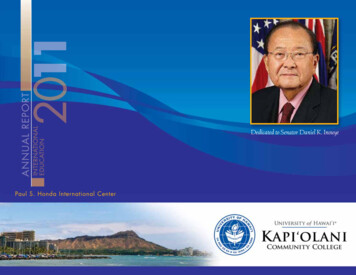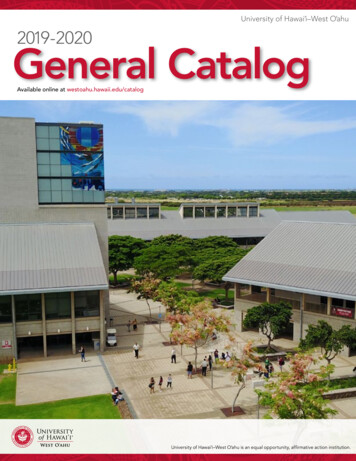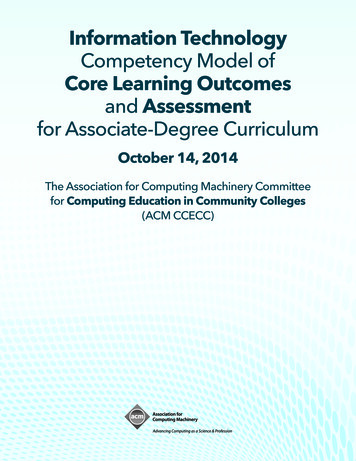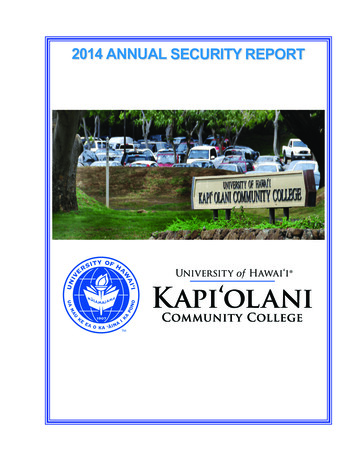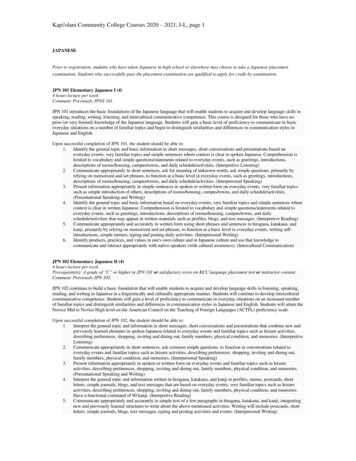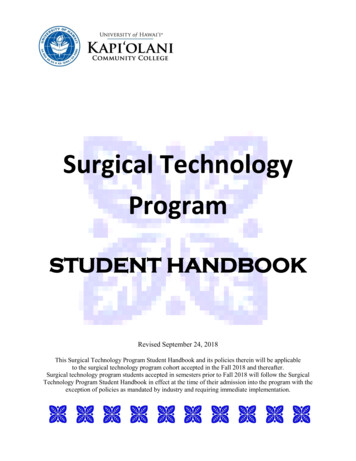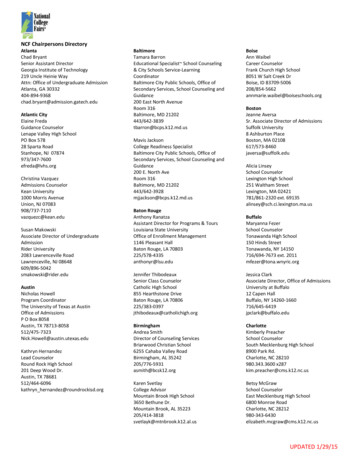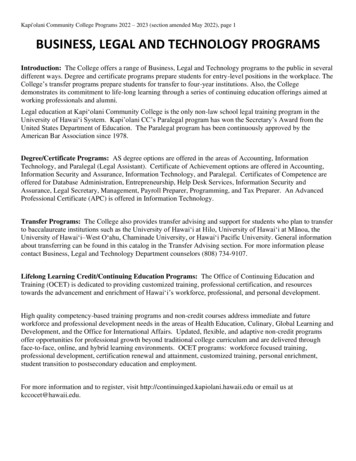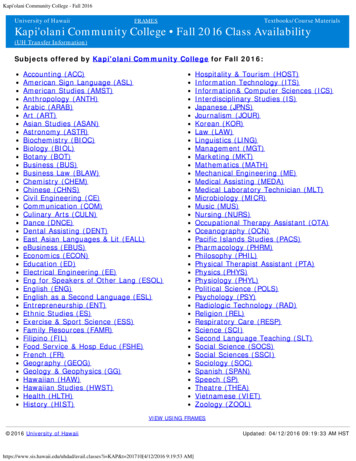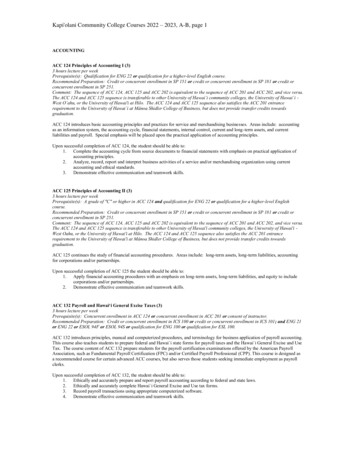
Transcription
Kapi'olani Community College Courses 2022 – 2023, A-B, page 1ACCOUNTINGACC 124 Principles of Accounting I (3)3 hours lecture per weekPrerequisite(s): Qualification for ENG 22 or qualification for a higher-level English course.Recommended Preparation: Credit or concurrent enrollment in SP 151 or credit or concurrent enrollment in SP 181 or credit orconcurrent enrollment in SP 251.Comment: The sequence of ACC 124, ACC 125 and ACC 202 is equivalent to the sequence of ACC 201 and ACC 202, and vice versa.The ACC 124 and ACC 125 sequence is transferable to other University of Hawai i community colleges, the University of Hawai i West O ahu, or the University of Hawai'i at Hilo. The ACC 124 and ACC 125 sequence also satisfies the ACC 201 entrancerequirement to the University of Hawai i at Mânoa Shidler College of Business, but does not provide transfer credits towardsgraduation.ACC 124 introduces basic accounting principles and practices for service and merchandising businesses. Areas include: accountingas an information system, the accounting cycle, financial statements, internal control, current and long-term assets, and currentliabilities and payroll. Special emphasis will be placed upon the practical application of accounting principles.Upon successful completion of ACC 124, the student should be able to:1.Complete the accounting cycle from source documents to financial statements with emphasis on practical application ofaccounting principles.2.Analyze, record, report and interpret business activities of a service and/or merchandising organization using currentaccounting and ethical standards.3.Demonstrate effective communication and teamwork skills.ACC 125 Principles of Accounting II (3)3 hours lecture per weekPrerequisite(s): A grade of "C" or higher in ACC 124 and qualification for ENG 22 or qualification for a higher-level Englishcourse.Recommended Preparation: Credit or concurrent enrollment in SP 151 or credit or concurrent enrollment in SP 181 or credit orconcurrent enrollment in SP 251.Comment: The sequence of ACC 124, ACC 125 and ACC 202 is equivalent to the sequence of ACC 201 and ACC 202, and vice versa.The ACC 124 and ACC 125 sequence is transferable to other University of Hawai'i community colleges, the University of Hawai'i West Oahu, or the University of Hawai'i at Hilo. The ACC 124 and ACC 125 sequence also satisfies the ACC 201 entrancerequirement to the University of Hawai'i at Mânoa Shidler College of Business, but does not provide transfer credits towardsgraduation.ACC 125 continues the study of financial accounting procedures. Areas include: long-term assets, long-term liabilities, accountingfor corporations and/or partnerships.Upon successful completion of ACC 125 the student should be able to:1.Apply financial accounting procedures with an emphasis on long-term assets, long-term liabilities, and equity to includecorporations and/or partnerships.2.Demonstrate effective communication and teamwork skills.ACC 132 Payroll and Hawai‘i General Excise Taxes (3)3 hours lecture per weekPrerequisite(s): Concurrent enrollment in ACC 124 or concurrent enrollment in ACC 201 or consent of instructor.Recommended Preparation: Credit or concurrent enrollment in ICS 100 or credit or concurrent enrollment in ICS 101; and ENG 21or ENG 22 or ESOL 94F or ESOL 94S or qualification for ENG 100 or qualification for ESL 100.ACC 132 introduces principles, manual and computerized procedures, and terminology for business application of payroll accounting.This course also teaches students to prepare federal and Hawai i state forms for payroll taxes and the Hawai i General Excise and UseTax. The course content of ACC 132 prepare students for the payroll certification examinations offered by the American PayrollAssociation, such as Fundamental Payroll Certification (FPC) and/or Certified Payroll Professional (CPP). This course is designed asa recommended course for certain advanced ACC courses, but also serves those students seeking immediate employment as payrollclerks.Upon successful completion of ACC 132, the student should be able to:1.Ethically and accurately prepare and report payroll accounting according to federal and state laws.2.Ethically and accurately complete Hawai i General Excise and Use tax forms.3.Record payroll transactions using appropriate computerized software.4.Demonstrate effective communication and teamwork skills.
Kapi'olani Community College Courses 2022 – 2023, A-B, page 2ACC 134 Individual Income Tax Preparation (3)3 hours lecture per weekPrerequisite(s): Qualification for ENG 21 or qualification for ENG 22 or qualification for ESOL 94F or qualification for ESOL 94Sor qualification for an equivalent course.Recommended Preparation: Credit or concurrent enrollment in ICS 100 or credit or concurrent enrollment in ICS 101.ACC 134 introduces the preparation of federal and state of Hawai‘i individual income tax returns with an emphasis on law andregulations and their application to the tax returns. This course is intended for an individual preparing basic tax returns under thesupervision of an accounting professional. Student will learn to conduct basic tax research using online tax research database andresources. Student will also learn to prepare tax returns both manually and by using commercial tax software such as CCH Prosystemfx (CCH, Commercial Clearing House, a division of Wolters Kluwer).Upon successful completion of ACC 134, the student should be able to:1.Ethically and accurately apply federal and state laws to prepare individual tax returns.2.Use basic tax research techniques.3.Demonstrate effective communication and teamwork skills.ACC 137 Business Income Tax Preparation (3)3 hours lecture per weekPrerequisite(s): A grade of "C" or higher in ACC 134 or consent of instructor.Recommended Preparation: Credit or concurrent enrollment in ICS 100 or credit or concurrent enrollment in ICS 101.ACC 137 introduces Federal and Hawai'i tax laws and regulations and basic return preparation for business entities. This course isintended for an individual preparing basic tax returns under the supervision of an accounting professional. The student will learn toconduct basic tax research using online database and resources. The student will also learn to prepare tax returns both manually andby using commercial tax software such as CCH Prosystem fx (R) (CCH, Commercial Clearing House, a division of Wolters Kluwer).Upon successful completion of ACC 137, the student should be able to:1.Ethically apply federal and state laws to prepare tax returns for business entities.2.Use basic tax research techniques.3.Demonstrate effective communication and teamwork skills.ACC 201 Introduction to Financial Accounting (3)3 hours lecture per weekPrerequisite(s): Qualification for ENG 100 or qualification for ESL 100 or qualification for an equivalent course.Recommended Preparation: Credit or concurrent enrollment in ICS 100 or credit or concurrent enrollment in ICS 101.ACC 201 introduces accounting principles and practices used to record and communicate financial information. Methods forvaluating assets, liabilities, and equity of an organization will be analyzed. The student will be introduced to the purpose andfundamentals of ethics and internal controls.Upon successful completion of ACC 201, the student should be able to:1.Complete the accounting cycle for a service and merchandising organization using current accounting standards.2.Analyze the effects of business transactions on the financial statements of an organization.3.Identify and apply basic internal control principles and accounting ethics in a business setting.4.Demonstrate effective communication and teamwork skills.ACC 202 Introduction to Managerial Accounting (3)3 hours lecture per weekPrerequisite(s): A grade of "C" or higher in ACC 201 or a grade of "C" or higher in both ACC 124 and ACC 125.Recommended Preparation: Credit or concurrent enrollment in ICS 100 or credit or concurrent enrollment in ICS 101.ACC 202 introduces managerial accounting methods for evaluating performance including cost accounting, budgeting, break-evenanalysis, ratio analysis, standard cost systems, and reporting for internal decision making.Upon successful completion of ACC 202, the student should be able to:1.Analyze, record, report and interpret business activities of manufacturing and other organizations using current accountingstandards and technology.2.Prepare information and reports that may be used by management for planning, control and decision making purposes.3.Demonstrate effective communication and teamwork skills.4.Evaluate alternatives using various methods of entity-wide and project financing.
Kapi'olani Community College Courses 2022 – 2023, A-B, page 3ACC 221 Practical Intermediate Accounting (3)3 hours lecture per weekPrerequisite(s): Credit or concurrent enrollment in ENG 100 or credit or concurrent enrollment in ESL 100; and a grade of "C" orhigher in both ACC 124 and ACC 125 or a grade of "C" or higher in ACC 201. Prerequisites may be waived by the consent ofAccounting Program Coordinator or Business, Legal & Technology Education Department Chairperson.Recommended Preparation: Credit or concurrent enrollment in SP 151 or credit or concurrent enrollment in SP 181 or credit orconcurrent enrollment in SP 251; and credit or concurrent enrollment in ICS 100 or credit or concurrent enrollment in ICS 101.ACC 221 provides in-depth coverage of Generally Accepted Accounting Principles (GAAP) students learned in ACC 201. Studentwill learn to apply GAAP recording and reporting requirements through practice sets and financial accounting research using industrystandard tools such as the Financial Accounting Standards Board (FASB) Accounting Standards Codification Professional View.Students also begin to organize accounting information using spreadsheets, and explore Enterprise Content Management Systems suchas CCH Engagement.Upon successful completion of ACC 221, the student should be able to:1.Demonstrate mastery of the manual accounting cycle and related internal controls, and discuss them within the frameworkof an accounting information system (AIS).2.Organize accounting information using industry standard tools and protocols.3.Prepare financial statements in accordance with GAAP, analyze them, and interpret them for stakeholders using industrystandard communication practices.4.Use FASB Codification and other research tools to answer basic accounting research questions clearly, concisely andaccurately.5.Demonstrate effective communication and teamwork skills.ACC 231 (Alpha) Professional Skills (3)3 hours lecture per weekPrerequisite(s): A grade of "C" or higher in ACC 221 and credit or concurrent enrollment in ACC 134 and credit or concurrentenrollment in ACC 255; or the consent of the instructor or the Accounting Program Coordinator or the Business, Legal & TechnologyEducation Department Chairperson.ACC 231(Alpha) covers the major hands-on practical skills paraprofessional accountants need to know. As the accounting functionevolves, topics covered in this course may vary maintain currency with industry standards. Course coverage emphasizes timely realworld situations and provides an opportunity for students to integrate new skills with competencies learned in prerequisite courses.Concepts will be discussed, demonstrated, exercised, and applied primarily through case studies and fieldwork. Successful studentswill be able to effectively demonstrate the use of their business analytical, teamwork, interpersonal, and communication skills - all at aparaprofessional accountant level.Upon successful completion of ACC 231 (Alpha), the student should be able to:1.Apply knowledge of the major components and features of an accounting system by providing substantive backupmaterials needed by supervising accountants or auditors.2.Investigate, describe, and try applications, utilities, or devices that help maintain an accounting entity's audit trail.3.Apply Generally Accepted Accounting Principles, internal control concepts, and ethical guidelines to accounting cases andfieldwork through use of industry-standard tools.4.Apply and integrate skills, tools, and knowledge gained through prerequisite Accounting and other course work todemonstrate competency in accounting problem identification and solution.5.Utilize workplace-standard accounting terminology and vocabulary and exhibit a paraprofessional level of conduct ininteractions with team members, accounting professionals, and in presentations6.Plan, organize, and carry out as a team a professionally run function that connects Accounting Program students, internaland external stakeholders, and other interested parties.ACC 231B Professional Skills: Research, Workpapers, and Systems Simulation (3)3 hours lecture per weekPrerequisite(s): A grade of "C" or higher in ENG 100 or a grade of "C" or higher in ESL 100; and a grade of "C" or higher in ACC134 and a grade of "C" or higher in ACC 221 and credit or concurrent enrollment in ACC 255; and a grade of "C" or higher in ICS100 or a grade of "C" or higher in ICS 101 or a grade of "C" or higher in a higher-level information and computer sciences course;and a grade of "C" or higher in SP 151 or a grade of "C" or higher in SP 181 or a grade of "C" or higher in SP 251. Prerequisitesmay be waived by the consent of Accounting Program Coordinator or Business, Legal & Technology Education DepartmentChairperson.
Kapi'olani Community College Courses 2022 – 2023, A-B, page 4ACC 231B emphasizes real world situations and provides an opportunity for students to demonstrate outcomes of their learning,critically assess and appropriately apply what has been learned. Through problem-based hands-on learning using industry standardtools such as CCH Accounting Research Manager(R), FASB Accounting Standards Codification(R), CCH Tax Research ConsultantLite(R), and CCH ProSystem fx Engagement(R), students will research financial accounting, taxation, and enterprise contentmanagement issues. At the paraprofessional accountant level, students will utilize their business teamwork principles, interpersonaland communication skills to solve business problems.Upon successful completion of ACC 231B, the student should be able to:1.Apply knowledge of the major components of an accounting system to workpaper problems/cases and fieldwork.2.Investigate and describe the application of Enterprise Content Management and Document Management systems inbusiness.3.Apply Generally Accepted Accounting Principles, internal control concepts, and ethical guidelines to financial accountingresearch and workpaper problems/cases and fieldwork.4.Apply and integrate skills, tools, and knowledge gained through prerequisite Accounting and other course work todemonstrate competency in complex accounting problem identification and solution.5.Utilize workplace-standard accounting terminology and vocabulary and exhibit a paraprofessional level of conduct ininteractions with team members, accounting professionals, and in presentations.6.Plan, organize, and carry out as a team an annual function that connects accounting professionals, students, faculty,potential employers, and community membersACC 252 Using QuickBooks in Accounting (3)3 hours lecture per weekPrerequisite(s): Credit or concurrent enrollment in ACC 124 or credit or concurrent enrollment in ACC 125 or credit or concurrentenrollment in ACC 201; and credit or concurrent enrollment in ICS 100 or credit or concurrent enrollment in ICS 101 or consent ofinstructor.Recommended Preparation: Credit or concurrent enrollment in SP 151 or credit or concurrent enrollment in SP 181 or credit orconcurrent enrollment in SP 251.Comment: A previous version of this course was formerly taught as ACC 150. ACC 252 is required by the Certificate of Competence,Payroll Preparer, the CA in Accounting and the AS in Accounting. Students are expected to provide their own USB flash drive with8GB or higher capacity. The ACC 252 course uses Windows PC based QuickBooks Pro Accounting software, therefore AppleMacintosh users may have to purchase and install additional software to emulate Windows PC operations. A card containing anAccess Code for download of a 140-day free trial version of the software is bundled with new textbooks. The textbook for this courseshould be purchased at the KapCC Bookstore, or inclusion of the Access Code should be confirmed with other textbook vendorBEFORE purchase. Please do not install free trial QuickBooks until the first week of class.ACC 252 provides "hands-on" approach to computerized accounting using QuickBooks . This course applies previously acquiredaccounting skills and knowledge in a computerized environment to setup and maintain accounting records. Emphasis will be placedon the application of QuickBooks to the accounting cycle. This course also presents the basic concepts of an accounting informationsystem and methods to document such systems. The course content of ACC 252 prepares students for the QuickBooks CertificationExamination.Upon successful completion of ACC 252 the student should be able to:1.Apply fundamental accounting principles to set up and maintain records using QuickBooks.2.Evaluate and communicate business performance based on various reports.3.Demonstrate effective communication and teamwork skills.ACC 255 Using Excel in Accounting (3)3 hours lecture per weekPrerequisite(s): A grade of "C" or higher in ACC 201 or a grade of "C" of higher in both ACC 124 and ACC 125; and credit orconcurrent enrollment in ICS 101; and credit or concurrent enrollment in BUS 100 or credit or concurrent enrollment in BUS 250 orcredit or concurrent enrollment in Math 115. Prerequisites may be waived by the consent of instructor, Accounting ProgramCoordinator or Business, Legal, & Technology Education Department Chairperson.ACC 255 provides hands-on training in the use of spreadsheets to solve accounting problems. Coursework involves application ofpreviously acquired accounting skills and knowledge with emphasis on financial and managerial accounting. This course also reviewsbasic database concepts, and introduces basic Data Analytics concepts and applications in accounting.Upon successful completion of ACC 255, the student should be able to:1.Compile financial data utilizing an electronic spreadsheet, and generate accurate and relevant output.2.Analyze results of accounting problems and use the results to propose business recommendations.3.Explain basic database and data analytics concepts and their applications in accounting.4.Demonstrate effective communication and teamwork skills.ACC 261 (Alpha) Accounting Information and Management Systems Topics (3)3 hours lecture per week
Kapi'olani Community College Courses 2022 – 2023, A-B, page 5Prerequisite(s): A grade of "C" or higher in ACC 252 and a grade of "C" or higher in ACC 255; and a grade of "C" or higher in BUS100 or a grade of "C" or higher in BUS 250 or a grade of "C" or higher in MATH 115; and a grade of "C" or higher in ENG 100 or agrade of "C" or higher in ESL 100; and a grade of "C" or higher in ICS 101; and a grade of "C" or higher in SP 151 or a grade of"C" or higher in SP 251. Prerequisites may be waived by the consent of instructor, the Accounting Program Coordinator, or theBusiness, Legal & Technology Education Department Chairperson.Comment: ACC 261 (Alpha) is repeatable for a maximum of six credits. A student may not repeat the same topic course for additionalcredit. Students must have working knowledge of University of Hawai'i sponsored Google applications.ACC 261 (Alpha) covers the hottest accounting technology trends impacting accounting information and management systems. Topicsare selected based on high wage, high demand career opportunities currently available in industry. The course is designed to enhancethe ability of students to think critically and to develop the knowledge, skills and attitudes necessary to compete effectively in therapidly changing world of accounting information technology. Students will research and present how companies are using theselected emerging technologies to enhance their accounting information and management systems.Upon successful completion of ACC 261, the student should be able to:1.Explain the importance of the selected technology trends in accounting information and management systems.2.Use standard terminology and vocabulary commonly used in the selected technology trends.3.Demonstrate proficiency in the use of the selected technologies.4.Demonstrate effective communication and teamwork skills.5.Demonstrate sound business ethics and perform efficiently at the paraprofessional level.ACC 293 Accounting Internship (3)1 hour lecture, 8 hours internship per weekPrerequisite(s): Credit or concurrent enrollment in ACC 231B or credit in ACC 251B or credit or concurrent enrollment in ACC251C. Prerequisites may be waived by the consent of instructor, Accounting Program Coordinator or Business, Legal, & TechnologyEducation Department Chairperson.Comment: ACC 293 is repeatable for a maximum of nine credits, however only three credits may be applied towards the fulfillment ofthe AS Accounting degree requirements. Letter grade only. May not be audited. May not be taken credit/no credit.ACC 293 is an internship course involving a student to employer (or sponsoring organization) cooperative arrangement that integratesclassroom learning with supervised, structured practical work experience. In addition, employment-seeking skills such as job search,resume writing, interviewing, application form filling, professional attitude and attire will be emphasized. A student's backgroundknowledge and skills are considered when recommending students for available positions. This course offers the opportunity forstudents to apply and further develop workplace soft skills and accounting skills.Upon successful completion of ACC 293, the student should be able to:1.Perform job search using appropriate tools; follow standards of etiquette and practice appropriate oral and writtencommunication skills to apply for and secure available positions.2.Complete assigned job duties and resolve problems independently and as part of a team.3.Analyze and relate the job duties to principles, concepts or procedures covered in the ACC course of study.4.Identify the personal qualities, work habits, work ethics, and attitudes and other competencies determined by the instructorand the employer that lead to professionalism in the work place.AMERICAN SIGN LANGUAGEASL 101 Elementary American Sign Language I (4) KCC AA/HSL4 hours lecture per weekASL 101 emphasizes the development of both receptive and expressive skills. Course content includes basic vocabulary,fingerspelling, syntax, and grammatical structures. Everyday communication is the centerpiece of every lesson. Grammar isintroduced in context, with an emphasis on developing question and answering skills. Exploration of the history of ASL and culturalaspects within the Deaf community will also be introduced.Upon successful completion of ASL 101, the student should be able to:1.Demonstrate the basic syntax in American Sign Language.2.Recognize and produce appropriate grammatical structures, facial grammar, sign vocabulary, personal and possessivepronouns, classifiers and fingerspelling.3.Demonstrate how to sign various types of numbers: cardinal (1-100), ordinal, age, clock time, basic number sentencescorrectly.4.Demonstrate communicative competence in ASL related to oneself, family, academic, and real-world surroundings.5.Demonstrate how to navigate a signing environment and appropriate greetings and attention getting behaviors.6.Discuss aspects and issues of the Deaf Community, including its culture, the differences between Deaf and Hearingcultures; how Deaf and Hearing people have interacted historically, and the role of ASL in the lives of Deaf people.ASL 102 Elementary American Sign Language II (4) KCC AA/HSL4 hours lecture per week
Kapi'olani Community College Courses 2022 – 2023, A-B, page 6Prerequisite(s): A grade of "C" or higher in ASL 101 or a grade of "C" or higher in an equivalent course or consent of instructor.ASL 102 builds upon the student’s prior knowledge and experience from ASL 101. This course focuses on building narrative skillsand developing real-world conversational skills used in everyday discussions. It also develops the receptive and expressive skills, andallows recognition and demonstration of more sophisticated grammatical features of American Sign Language. Increased fluency andaccuracy in fingerspelling, numbers and sign vocabulary will be emphasized.Upon successful completion of ASL 102, the student should be able to:1.Give and confirm directions, interrupt, use spatial referencing and explain the differences in cardinal and ordinal numbersin ASL.2.Identify and accurately describe people who are present and not present, contrast people, and use numbers in multiples of5, 10 and 11 in ASL3.Initiate requests, accept or decline offers, use spatial and inflecting verbs, and use numbers when talking about money andwhole numbers from 51-75 in ASL.4.Demonstrate relationships, ages and length of time, and the use of whole numbers 67-98 in ASL.5.Contradict opinions and contrast two or more people/things in ASL.6.Discuss aspects of the Deaf Community, including the history of Deaf people and their interactions with hearing people,and the role of ASL in the lives of Deaf people.ASL 201 Intermediate American Sign Language I (4) KCC AA/HSL4 hours lecture per weekPrerequisite(s): A grade of "C" or higher in ASL 102 or a grade of "C" or higher in an equivalent course or consent of instructor.ASL 201 emphasizes and expands on grammar, syntax, spatial referencing, classifiers, and vocabulary development. Students willdevelop effective and fluent ASL expressive and receptive skills. Fluency and accuracy of fingerspelling will be developed as well asthe use of lexicalized signs. This course continues to expand knowledge of experiences in ASL and understanding of deaf community,culture and history within the context of their application to ASL skills.Upon successful completion of ASL 201, the student should be able to:1.Demonstrate basic, functional conversational skills in ASL through giving opinions, discussing plans and goals, anddescribing things and places in detail.2.Demonstrate effective production of ASL signs, quantifiers, numerical signs, request signs, lexicalized fingerspelling incomplete sentences, and in a narrative structure through signed assignments.3.Recognize ASL grammar features: topic-comment structure, ordinal numbers, referencing, locative, semantic anddescriptive classifiers, time signs (recurring and continuous), inflecting verbs, role shifting, conditional sentences, whenclauses, contrastive structure, and possessive forms.4.Discuss the aspects of the deaf community, culture and history through assigned course materials and videos.5.Incorporate and utilize unique ways to get engaged in conversations using ASL for negotiations, making suggestions,requests, or complaints.ASL 202 Intermediate American Sign Language II (4) KCC AA/HSL4 hours lecture per weekPrerequisite(s): A grade of "C" or higher in ASL 201 or a grade of "C" or higher in an equivalent course or consent of instructor.ASL 202 refines the language skills and knowledge acquired in American Sign Language in ASL 101-201, adding more sophisticatedASL grammatical features and vocabulary, short stories, narratives, and dialogues. To increase their fluency and accuracy, studentswill give descriptions of the objects and places, appropriate sequencing about their life events and "the weekend" stories. This coursecontinues to expand the knowledge and experiences in ASL, and promote students' understanding of the deaf culture, history, andcommunity.Upon successful completion of ASL 202, the student should be able to:1.Demonstrate the ability to identify and distinguish objects in ASL.2.Accurately express spatial agreement between the location of the people, places and things in ASL.3.Identify and produce ASL classifiers: locative, descriptive and instrumental.4.Demonstrate advanced proficiency in ASL fingerspelling, numbers, and lexicalized signs.5.Accurately produce a storytelling sequence incorporating all grammatical functions in ASL.6.Compare and contrast the study of ASL and deaf community, culture and history with one’s background and lifeexperience.ASL 203 Advanced American Sign Language I (4) KCC AA/HSL4 hours lecture per weekPrerequisite(s): A grade of "C" or higher in ASL 202 or a grade of "C" or higher in an equivalent course or consent of instructor.ASL 203 applies knowledge of American Sign Language grammar and vocabulary to the description of increasingly complexconstructs, processes and situations. Students will incorporate multiple character roles shifting into medium-length stories, narrativesand the discussion of hypothetical issues. Cultural values and attitudes as they relate to the Deaf community are also examined.
Kapi'olani Community College Courses 2022 – 2023, A-B, page 7Upon successful completion of ASL 203, the student should be able to:1.Demonstrate advanced grammatical structures in ASL.2.Narrate personal stories following ASL narrative structure.3.Demonstrate narratives and stories in ASL.4.Demonstrate an advanced conversational level of receptive skills in ASL.5.Focus on building narrative skills, moving from an informal to a more formal presentation.6.Distinguish between opinions and facts in ASL.7.Accurately produce sequence classifiers in order to fully describe what happened.ASL 204 Advanced American Sign Language II (4) KCC AA/HSL4 hours lecture per weekPrerequisite(s): A grade of "C" or higher in ASL 203 or a grade of "C" or higher in an equivalent course or consent of instructor.ASL 204 that builds on the cultural compet
ACC 124 introduces basic accounting principles and practices for service and merchandising businesses. Areas include: accounting as an information system, the accounting cycle, financial statements, internal control, current and long-term assets, and current liabilities and payroll.
